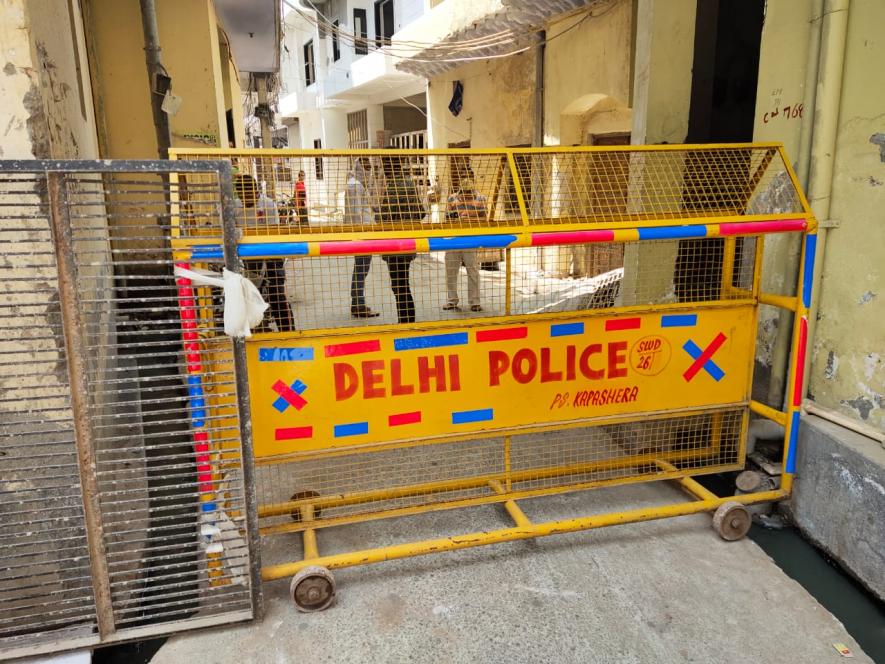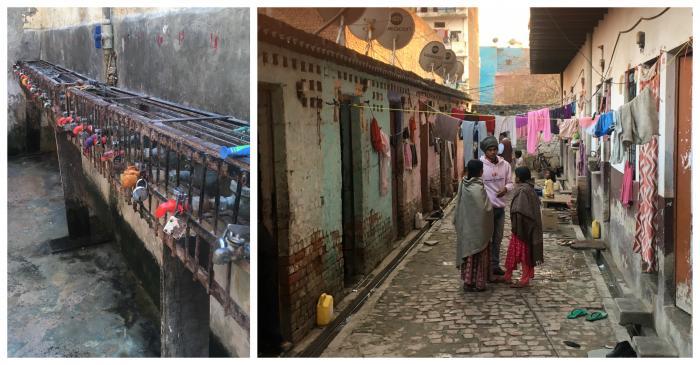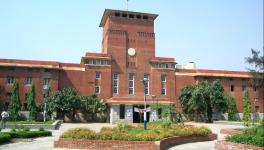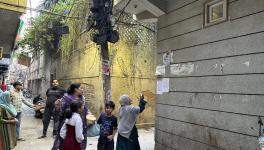COVID-19: Locked Down in Crammed Rooms, Residents of Virus-Hit Kapashera Fear the Worst

Delhi Police barricaded a lane in South West Delhi's Kapas Hera as 58 from one building were found to be tested positive with COVID-19. Image Courtesy - Twitter
Kanhaiya Kumar sounded distressed over the phone. When asked why, he said he was worried about how he looked. “Since the lockdown began, I have been eating lesser and lesser as the days pass,” said the 22-year old.
Kumar is a resident of Kapashera, a village in South-West Delhi, bordering Gurugram in Haryana, its inhabitants largely labourers. Last month, this slum cluster, where thousands of migrant workers reside, was hit by the novel coronavirus. Days later, on May 3, as many as 58 persons from same building tested positivefor COVID-19, the disease caused by virus.
Life in Kapashera was never easy, according to Kumar, who was employed in a garment company in Gurugram’s Udyog Vihar which is currently shut down due to the ongoing lockdown. “There was never enough money to meet expenses. However, now there is no money at all,” he said.
Kumar has not even received his salary for March. He is required to stand in line – for hours on end on some days – to collect an “inedible” meal. “There is no point in living such a life, I will go back to my village (in Motihari, Bihar) once the lockdown is lifted,” he said.
Kumar is not alone in deciding that he would like to return home, at a time when life has become significantly tougherwith a virus-induced lockdown in place. He has to get by and meet urban expenses with almost no income. It is tougher for people who were already living on the edge.
Ganesh, 22, lives with his parents in a crammed room which measures 100 square feet in one of many buildings in Kapashera. A company official from his workplace in Udyog Vihar called him on April 25, informing him that work would begin soon and that his presence is required.
The movement restrictions in the area are now testing his patience. “The police does not allow me to cross the border (Delhi-Gurugram) as positive cases have been found in the nearby building. Earlier, there was some relaxation in place but even that is gone now,” Ganesh said. “I haven’t received any salary for April. I now fear for my job,” he added.
Not all who reside in Kapashera work in Udyog Vihar’s garment companies, but the looming fear of losing jobs among the workersisaffecting the local economy of the village – even those who are permitted to engage in commerce.
Durga Devi, 35, is a street hawker who sells vegetables in Kapashera. “The main road market, and its daily crowd does not exist anymore. As a result, my monthly earnings, which used to be close to Rs 10,000 have now come down to betweenRs 4000 and Rs 5000,” she said over the phone.
According to her, it has led her family to seriously consider going back to their village in Uttar Pradesh. “Many in my own building have lost their jobs and are left with no income. If they do not have the money, who will buy from us?” she asked. Devi added that it made her worry further about the health of her four daughters and her husband.
In Kapashera, many are still burdened by electricity and water charges, despite the AAP government waiving tariffs on both to a certain degree – up to 20,000 litres of water and 200 units of power every month. Labourers sharing rooms, with four persons in a room in many cases, are served by common toilets on each floor. Tap water is chargeable at the rate of Rs 100 for every thousand litres. In such conditions, it is not surprising that even local authorities are worried of a possible surge in cases, knowing fully well that adherence to social distancing norms is next to impossible.

Locked water taps in Kapas Hera, where residents are still charged for consuming water (left). Housing lodges in Kapas Hera where labourers, mostly young, reside (right). File Photo
“...keeping in mind the high density of population,” the district administration of South-West Delhi sealed and contained the building from which cases of viral infection were reported in mid-April, the district magistrate said on May 3 in a note shared on Twitter.
People are being screened and samples are being collected in an attempt to restrict the spread of coronavirus in the area, a police official told NewsClick. Food packets and medicines are being supplied to the residents who are in the containment zone, the official added.
However, even the “proactive” decision of the administration, as claimed in the May 3 note, wasnot without its delays, and residents are now gripped with fear of a possible outbreak in the area.
According to the note, the test results for those that tested positive for COVID-19 took as many as 13 days. It was put down to “issues of blockade at Delhi-Noida border and due to pendency backlog at NIB [National Institute of Biologicals] Noida.”
“The 13-day delay is scary as the virus could have spread to others in those days,” said Azam, 20, a call-centre worker who resides in Kapashera. “Such a delay should not have happened. Now, we do not even know how big the problem before us is.”
The note by the DM confirmed that the individuals tested positive were “asymptomatic”, raising further concerns. A re-test is to be conducted in the next two days “to assess the present status of all positive cases” in Kapashera. Three days later, it is not clear, even to the local residents of Kapashera and to the general public, of howmany samples were collected and the degree of spread of the virus in a labour colony of national capital. Calls made to the offices of the District Magistrate and Sub-District Magistrate (Kapashera division) went unanswered.
Get the latest reports & analysis with people's perspective on Protests, movements & deep analytical videos, discussions of the current affairs in your Telegram app. Subscribe to NewsClick's Telegram channel & get Real-Time updates on stories, as they get published on our website.
























